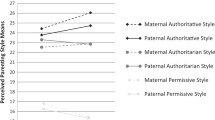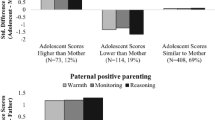Abstract
While different patterns of perceived parenting discrepancy among mother-adolescent dyads have been shown to be associated with adolescent internalizing symptoms, little is known about the pathway underlying such associations, particularly among immigrant families. The current study considered one culturally salient form of mother-adolescent communication, language brokering (i.e., adolescents translating and interpreting between host and heritage languages for mothers), in order to investigate its mediating role based on two waves of longitudinal data on Mexican-origin immigrant families. Wave 1 included 604 adolescents (54% female; Mage = 12.92, SD = 0.92) and 595 mothers (Mage = 38.89, SD = 5.74); Wave 2 was collected one year later with data from 483 adolescents. Perceived parenting discrepancy patterns at Wave 1 were captured by three profiles based on the levels of both mothers’ and adolescents’ perceived positive parenting (i.e., Mother High, Adolescent High, and Both High). Compared to the other two profiles, adolescents who reported much lower positive parenting than mothers at Wave 1 (i.e., Mother High) experienced more negative feelings about brokering at Wave 2, relating to more anxiety. Being in the Mother High (vs. Both High) group was also directly related to more depressive symptoms one year later. This study highlights the importance of considering culturally salient forms of communication, such as language brokering, when designing family-level interventions to reduce adolescents’ internalizing symptoms by building agreement on high positive parenting among mother-adolescent dyads from immigrant families.


Similar content being viewed by others
References
Afifi, T. D., Hutchinson, S., & Krouse, S. (2006). Toward a theoretical model of communal coping in postdivorce families and other naturally occurring groups. Communication Theory, 16, 378–409. https://doi.org/10.1111/j.1468-2885.2006.00275.x.
Beck, A. T. (2002). Cognitive models of depression. Clinical advances in cognitive psychotherapy: Theory and application, 14(1), 29–61.
Buriel, R., Love, J. A., & De Ment, T. L. (2006). The Relation of Language Brokering to Depression and Parent-Child Bonding Among Latino Adolescents. In M. H. Bornstein & L. R. Cote (Eds.), Acculturation and parent-child relationships: Measurement and development. (pp. 249–270). Lawrence Erlbaum Associates Publishers.
Cruz, R. A., Navarro, C., Carrera, K., Lara, J., Mechammil, M., & Robins, R. W. (2021). Mexican-Origin youths’ trajectories of internalizing symptoms from childhood into adolescence and associations with acculturation processes. Journal of Clinical Child & Adolescent Psychology, 50(1), 118–130. https://doi.org/10.1080/15374416.2019.1622120.
De Los Reyes, A., Lerner, M. D., Thomas, S. A., Daruwala, S., & Goepel, K. (2013). Discrepancies Between Parent and Adolescent Beliefs About Daily Life Topics and Performance on an Emotion Recognition Task. Journal of Abnormal Child Psychology, 41(6), 971–982. https://doi.org/10.1007/s10802-013-9733-0.
De Los Reyes, A., & Ohannessian, C. M. (2016). Introduction to the special issue: Discrepancies in adolescent–parent perceptions of the family and adolescent adjustment. Journal of Youth and Adolescence, 45(10), 1957–1972. https://doi.org/10.1007/s10964-016-0533-z.
Ge, X., Best, K. M., Conger, R. D., & Simons, R. L. (1996). Parenting behaviors and the occurrence and co-occurrence of adolescent depressive symptoms and conduct problems. Developmental Psychology, 32(4), 717–731. https://doi.org/10.1037/0012-1649.32.4.717.
Guion, K., Mrug, S., & Windle, M. (2009). Predictive value of informant discrepancies in reports of parenting: relations to early adolescents' adjustment. Journal of Abnormal Child Psychology, 37(1), 17–30. https://doi.org/10.1007/s10802-008-9253-5.
Guntzviller, L. M., & Wang, N. (2019). Mother-adolescent communication in low-income, Latino families during language brokering: Examining the Theory of Resilience and Relational Load. Journal of Family Communication, 19(3), 228–242. https://doi.org/10.1080/15267431.2019.1628764.
Han, Y., Grogan-Kaylor, A., Bares, C., Ma, J., Castillo, M., & Delva, J. (2012). Relationship between discordance in parental monitoring and behavioral problems among Chilean adolescents. Children and Youth Services Review, 34(4), 783–789. https://doi.org/10.1016/j.childyouth.2012.01.005.
Hou, Y., Benner, A. D., Kim, S. Y., Chen, S., Spitz, S., Shi, Y., & Beretvas, T. (2020). Discordance in parents' and adolescents' reports of parenting: A meta-analysis and qualitative review. American Psychologist, 75(3), 329–348. https://doi.org/10.1037/amp0000463.
Hou, Y., Kim, S. Y., & Benner, A. D. (2018). Parent–adolescent discrepancies in reports of parenting and adolescent outcomes in Mexican immigrant families. Journal of Youth and Adolescence, 47(2), 430–444. https://doi.org/10.1007/s10964-017-0717-1.
Kam, J. A., Basinger, E. D., & Guntzviller, L. M. (2017). Communal coping among Spanish-speaking mother–child dyads engaging in language brokering: A latent class analysis. Communication Research, 44(5), 743–769. https://doi.org/10.1177/0093650216684927.
Kam, J. A., & Lazarevic, V. (2014). Communicating for one’s family: An interdisciplinary review of language and cultural brokering in immigrant families. Annals of the International Communication Association, 38(1), 3–37. https://doi.org/10.1080/23808985.2014.11679157.
Kim, S. Y., Hou, Y., & Gonzalez, Y. (2017). Language brokering and depressive symptoms in Mexican‐American adolescents: Parent–child alienation and resilience as moderators. Child Development, 88(3), 867–881. https://doi.org/10.1111/cdev.12620.
Kim, S. Y., Hou, Y., Shen, Y., & Zhang, M. (2017). Longitudinal measurement equivalence of subjective language brokering experiences scale in Mexican American adolescents. Cultural Diversity & Ethnic Minority Psychology, 23(2), 230–243. https://doi.org/10.1037/cdp0000117.
Kim, S. Y., Hou, Y., Song, J., Schwartz, S. J., Chen, S., Zhang, M., & Parra-Medina, D. (2018). Profiles of language brokering experiences and contextual stressors: Implications for adolescent outcomes in Mexican immigrant families. Journal of Youth and Adolescence, 47(8), 1629–1648. https://doi.org/10.1007/s10964-018-0851-4.
Leung, J. T., & Shek, D. T. (2014). Parent–adolescent discrepancies in perceived parenting characteristics and adolescent developmental outcomes in poor Chinese families. Journal of Child and Family Studies, 23(2), 200–213. https://doi.org/10.1007/s10826-013-9775-5.
Mendelson, T., Kubzansky, L. D., Datta, G. D., & Buka, S. L. (2008). Relation of female gender and low socioeconomic status to internalizing symptoms among adolescents: a case of double jeopardy. Social Science & Medicine, 66(6), 1284–1296. https://doi.org/10.1016/j.socscimed.2007.11.033.
Muthén, L. K., & Muthén, B. O. (1998-2017). Mplus user’s guide. Eighth edition. Muthén & Muthén.
Pew Research Center. (2020). Facts on U.S. immigrants, 2018: Statistical portrait of the foreign-born population in the United States. https://www.pewresearch.org/hispanic/2020/08/20/facts-on-u-s-immigrants/.
Radloff, L. S. (1977). The CES-D Scale: A self-report depression scale for research in the general population. Applied Psychological Measurement, 1(3), 385–401. https://doi.org/10.1177/014662167700100306.
Reynolds, C. R., & Richmond, B. O. (1997). What I think and feel: A revised measure of children’s manifest anxiety. Journal of Abnormal Child Psychology, 25(1), 15–20. https://doi.org/10.1023/A:1025751206600.
Roche, K., Lambert, S., Ghazarian, S., & Little, T. (2015). Adolescent language brokering in diverse contexts: Associations with parenting and parent–youth relationships in a new immigrant destination area. Journal of Youth and Adolescence, 44(1), 77–89. https://doi-org.ezproxy.lib.utexas.edu/10.1007/s10964-014-0154-3.
Shen, Y., Seo, E., Jiles, A. I., Zheng, Y., & Wang, Y. (2022). Language brokering and immigrant-origin youth’s well-being: A meta-analytic review. American Psychologist, 77, 921–939. https://doi.org/10.1037/amp0001035.
Sim, L., Kim, S. Y., Zhang, M., & Shen, Y. (2019). Parenting and centrality: The role of life meaning as a mediator for parenting and language broker role identity. Journal of Youth and Adolescence, 48(3), 510–526. https://doi.org/10.1007/s10964-018-0963-x.
Villanueva, C. M., & Buriel, R. (2010). Speaking on behalf of others: A qualitative study of the perceptions and feelings of adolescent Latina language brokers. Journal of Social Issues, 66, 197–210. https://doi.org/10.1111/j.1540-4560.2009.01640.x.
Weisskirch, R. S. (2013). Family relationships, self-esteem, and self-efficacy among language brokering Mexican American emerging adults. Journal of Child and Family Studies, 22(8), 1147–1155. https://doi.org/10.1007/s10826-012-9678-x.
Wen, W., Chen, S., Kim, S. Y., & Hou, Y. (2023). Mother-adolescent perceived parenting profiles and Mexican-origin adolescents’ academic performance. Journal of Youth and Adolescence, 52(2), 344–358. https://doi.org/10.1007/s10964-022-01696-0.
Funding
This research was supported through awards to Su Yeong Kim from (1) National Science Foundation, Division of Behavioral and Cognitive Sciences, 1651128 and 0956123, (2) National Institute on Minority Health and Health Disparities 1R21MD012706-01A1 and 3R21MD-012706-02S1, (3) Eunice Kennedy Shriver National Institute of Child Health and Human Development 5R03HD060045-02, (4) Russell Sage Foundation, 2699, (5) Spencer Foundation, 10023427, (6) Hogg Foundation for Mental Health JRG-102, (7) Office of the Vice President for Research and Creative Grant and Special Research Grant from the University of Texas at Austin, (8) College of Natural Sciences Catalyst Grant from the University of Texas at Austin, and (9) Eunice Kennedy Shriver National Institute of Child Health and Human Development 5P2CHD042849-20 grant awarded to the Population Research Center at The University of Texas at Austin. No potential competing interest was reported by the authors.
Data Sharing and DeclarationData for this manuscript will not be deposited. Data from this study are not available because the sample is a vulnerable population living in a limited geographic area that might be identified based on the data.
Author information
Authors and Affiliations
Contributions
W.W. participated in conceptualizing the study, conducted statistical analyses, and drafted part of the manuscript; S.L. drafted part of the study and participated in the conceptualization; S.Y.S. participated in conceptualizing the study, interpreting the results, and providing critical reviews of the manuscript; C.S.T. participated in the interpretation of the results and provided a critical review of the manuscript; K.S.Y. designed the larger project, collected data, participated in the conceptualization of the current study and interpretation of the results, and provided reviews of the manuscript. All authors read and approved the final manuscript.
Corresponding author
Ethics declarations
Conflict of Interest
The authors declare no competing interests.
Ethical Approval
All procedures performed in studies involving human participants were in accordance with the ethical standards of the institutional and/or national research committee and with the 1964 Helsinki declaration and its later amendments or comparable ethical standards. All study materials and procedures were approved by the institutional review board at the University of Texas at Austin (2015010006).
Informed Consent
Informed consent was obtained from all individual participants included in the study.
Additional information
Publisher’s note Springer Nature remains neutral with regard to jurisdictional claims in published maps and institutional affiliations.
Rights and permissions
Springer Nature or its licensor (e.g. a society or other partner) holds exclusive rights to this article under a publishing agreement with the author(s) or other rightsholder(s); author self-archiving of the accepted manuscript version of this article is solely governed by the terms of such publishing agreement and applicable law.
About this article
Cite this article
Wen, W., Scott, L., Shen, Y. et al. Perceived Parenting Discrepancy Profiles, Feelings about Language Brokering, and Internalizing Symptoms among Mexican-origin Adolescents in Immigrant Families. J Youth Adolescence 52, 1799–1810 (2023). https://doi.org/10.1007/s10964-023-01817-3
Received:
Accepted:
Published:
Issue Date:
DOI: https://doi.org/10.1007/s10964-023-01817-3




